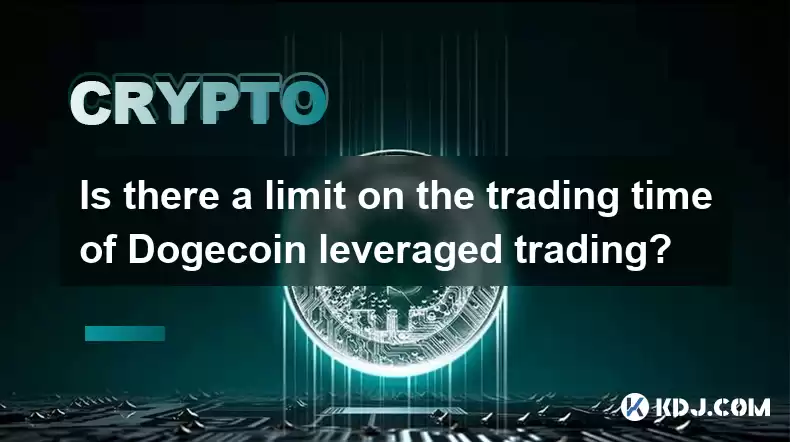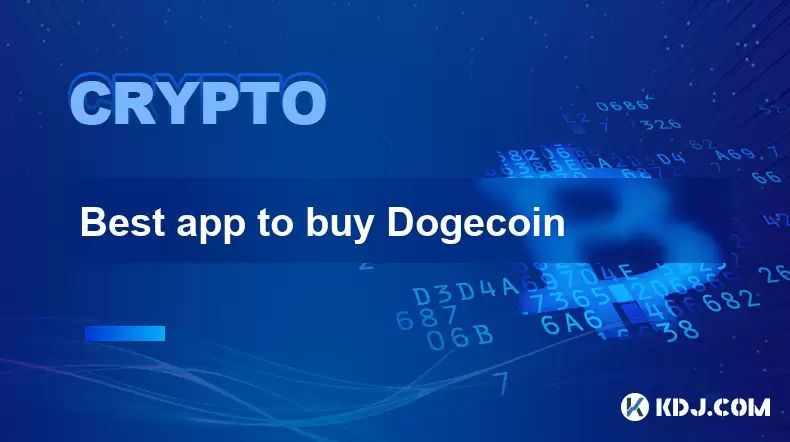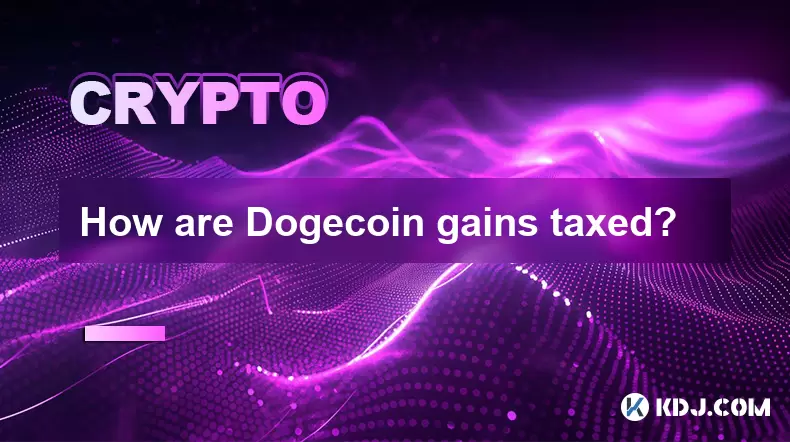-
 bitcoin
bitcoin $87959.907984 USD
1.34% -
 ethereum
ethereum $2920.497338 USD
3.04% -
 tether
tether $0.999775 USD
0.00% -
 xrp
xrp $2.237324 USD
8.12% -
 bnb
bnb $860.243768 USD
0.90% -
 solana
solana $138.089498 USD
5.43% -
 usd-coin
usd-coin $0.999807 USD
0.01% -
 tron
tron $0.272801 USD
-1.53% -
 dogecoin
dogecoin $0.150904 USD
2.96% -
 cardano
cardano $0.421635 USD
1.97% -
 hyperliquid
hyperliquid $32.152445 USD
2.23% -
 bitcoin-cash
bitcoin-cash $533.301069 USD
-1.94% -
 chainlink
chainlink $12.953417 USD
2.68% -
 unus-sed-leo
unus-sed-leo $9.535951 USD
0.73% -
 zcash
zcash $521.483386 USD
-2.87%
Is there a limit on the trading time of Dogecoin leveraged trading?
Dogecoin leveraged trading is theoretically 24/7, but broker maintenance, low liquidity (weekends/holidays), and volatility impact effective trading times. Broker-imposed leverage and position limits further restrict aggressive strategies.
Mar 14, 2025 at 12:45 am

- Dogecoin leveraged trading is available 24/7, mirroring the constant trading activity of the cryptocurrency market. However, specific brokerage platforms may have scheduled maintenance periods.
- Leverage magnifies both profits and losses, meaning trading time doesn't directly limit risk, but rather the market's volatility during that time.
- While trading is always possible, periods of low liquidity (e.g., weekends or holidays in certain regions) can lead to wider spreads and potentially slower execution speeds.
- Brokers might impose limits on position sizes and leverage ratios, indirectly affecting effective trading time by restricting aggressive strategies.
The simple answer is no, there isn't a fixed time limit on Dogecoin leveraged trading itself. Dogecoin, like other cryptocurrencies, trades around the clock, seven days a week. This means you theoretically can engage in leveraged Dogecoin trading at any point. However, several factors can influence your effective trading window and the practicality of trading at certain times.
The continuous nature of cryptocurrency markets is a defining characteristic. Unlike traditional stock markets with set opening and closing hours, you can access Dogecoin and leverage trading opportunities anytime. This 24/7 accessibility is a major draw for many traders, allowing participation from different time zones globally.
However, while the market is always open, your chosen brokerage platform might not be. Scheduled maintenance periods, often announced in advance, will temporarily halt trading on their platform, regardless of the cryptocurrency's availability. These periods are usually brief, but it's crucial to check your broker's announcements to avoid missed opportunities or unexpected disruptions.
Liquidity plays a vital role in leveraged trading. Liquidity refers to the ease with which an asset can be bought or sold without significantly impacting its price. During periods of low liquidity, such as weekends or holidays in major financial centers, the spreads (the difference between the bid and ask price) can widen considerably. This means you might pay more to enter a trade or receive less when exiting, potentially reducing your profitability. Execution speed can also slow down during these less active times.
While you can technically trade at any time, the effectiveness of your trading strategies is impacted by market conditions. High volatility periods, which can occur at any time, present both great opportunities and significant risks for leveraged trading. The increased risk is not tied to a specific time but rather to the inherent nature of leveraging and the market's unpredictable movements.
Leverage itself doesn't limit trading time but influences your risk exposure significantly. Your broker will likely impose limits on the amount of leverage you can use, and this can indirectly affect your trading strategy. For instance, you might be restricted from using high leverage during volatile periods, effectively reducing your trading capacity during those times. Similarly, maximum position sizes enforced by brokers might prevent you from fully capitalizing on perceived opportunities.
Many factors beyond simple trading hours influence leveraged Dogecoin trading. Understanding these factors – platform maintenance, liquidity fluctuations, market volatility, and brokerage restrictions – is crucial for successful and safe trading. Always stay informed about market conditions and your broker's policies.
Frequently Asked Questions:Q: Are there any specific times when Dogecoin leveraged trading is more advantageous?A: No, there isn't a universally "better" time. Market conditions are constantly changing, and what might be advantageous at one time might be risky at another. Successful trading relies on market analysis and understanding rather than specific trading hours.
Q: Does my broker’s location affect my ability to trade Dogecoin leveraged positions?A: Your broker's location can affect the trading hours they are operational and any regulatory restrictions they might face, potentially limiting your access during certain periods or entirely.
Q: Can I automate Dogecoin leveraged trading?A: Many platforms offer automated trading tools, but it's crucial to understand the risks involved and to carefully configure any automated systems. Automated trading doesn't eliminate the risks of leverage.
Q: What are the biggest risks associated with leveraged Dogecoin trading outside of normal market hours?A: Lower liquidity outside peak trading hours can lead to wider spreads and slower execution, potentially resulting in larger losses. Volatility can also be unpredictable regardless of the time of day.
Q: How do I find a reliable broker for Dogecoin leveraged trading?A: Research thoroughly, read reviews, and ensure the broker is regulated and offers robust security measures. Consider factors like fees, leverage options, and available trading tools.
Disclaimer:info@kdj.com
The information provided is not trading advice. kdj.com does not assume any responsibility for any investments made based on the information provided in this article. Cryptocurrencies are highly volatile and it is highly recommended that you invest with caution after thorough research!
If you believe that the content used on this website infringes your copyright, please contact us immediately (info@kdj.com) and we will delete it promptly.
- White House Brokers Peace: Crypto, Banks, and the Future of Finance
- 2026-01-31 18:50:01
- Rare Royal Mint Coin Discovery Sparks Value Frenzy: What's Your Change Worth?
- 2026-01-31 18:55:01
- Pi Network's Mainnet Migration Accelerates, Unlocking Millions and Bolstering Pi Coin's Foundation
- 2026-01-31 18:55:01
- Bitcoin Price Volatility Sparks Renewed Interest in Promising Blockchain Projects
- 2026-01-31 18:45:01
- UAE Central Bank Approves First Stablecoin, Paving Way for Digital Asset Regulation
- 2026-01-31 18:40:02
- Davos Dissent: Coinbase's Brian Armstrong Clashes with Wall Street's Old Guard
- 2026-01-31 18:40:02
Related knowledge

Bitcoincoin burning mechanism
Jul 20,2025 at 09:21pm
What is the Dogecoin burning mechanism?The Dogecoin burning mechanism refers to the process of permanently removing DOGE tokens from circulation by se...

How to earn free Bitcoincoin?
Jul 19,2025 at 10:08pm
What is Dogecoin and Why Earn It?Dogecoin (DOGE) started as a meme-based cryptocurrency in 2013 but has grown into a widely recognized digital asset. ...

Is Coinbase a good wallet for Bitcoincoin?
Jul 19,2025 at 04:42pm
Understanding Coinbase as a Wallet Option for DogecoinWhen considering where to store Dogecoin, Coinbase is often mentioned as a potential option due ...

How to buy Bitcoincoin with PayPal?
Jul 23,2025 at 06:57am
Understanding the Basics of Buying DogecoinBefore diving into the process of buying Dogecoin with PayPal, it’s essential to understand what Dogecoin i...

Best app to buy Dogecoin
Jul 23,2025 at 03:08pm
What Is a Cryptocurrency Exchange and How Does It Work?A cryptocurrency exchange is a digital marketplace where users can buy, sell, or trade cryptocu...

How are Dogecoin gains taxed?
Jul 25,2025 at 07:01am
Understanding the Taxation of Dogecoin GainsWhen it comes to Dogecoin (DOGE), many investors are drawn to its meme-inspired branding and volatile pric...

Bitcoincoin burning mechanism
Jul 20,2025 at 09:21pm
What is the Dogecoin burning mechanism?The Dogecoin burning mechanism refers to the process of permanently removing DOGE tokens from circulation by se...

How to earn free Bitcoincoin?
Jul 19,2025 at 10:08pm
What is Dogecoin and Why Earn It?Dogecoin (DOGE) started as a meme-based cryptocurrency in 2013 but has grown into a widely recognized digital asset. ...

Is Coinbase a good wallet for Bitcoincoin?
Jul 19,2025 at 04:42pm
Understanding Coinbase as a Wallet Option for DogecoinWhen considering where to store Dogecoin, Coinbase is often mentioned as a potential option due ...

How to buy Bitcoincoin with PayPal?
Jul 23,2025 at 06:57am
Understanding the Basics of Buying DogecoinBefore diving into the process of buying Dogecoin with PayPal, it’s essential to understand what Dogecoin i...

Best app to buy Dogecoin
Jul 23,2025 at 03:08pm
What Is a Cryptocurrency Exchange and How Does It Work?A cryptocurrency exchange is a digital marketplace where users can buy, sell, or trade cryptocu...

How are Dogecoin gains taxed?
Jul 25,2025 at 07:01am
Understanding the Taxation of Dogecoin GainsWhen it comes to Dogecoin (DOGE), many investors are drawn to its meme-inspired branding and volatile pric...
See all articles





















![Ultra Paracosm by IlIRuLaSIlI [3 coin] | Easy demon | Geometry dash Ultra Paracosm by IlIRuLaSIlI [3 coin] | Easy demon | Geometry dash](/uploads/2026/01/31/cryptocurrencies-news/videos/origin_697d592372464_image_500_375.webp)




















































